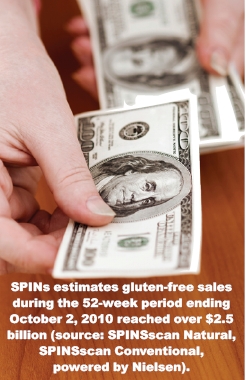Today’s natural consumers are savvy about labels. As the implications of understanding label claims and seeking out reputable certifications and stamps increases, shoppers are taking a closer look at their products before they buy.
Organic Personal Care: Are you Being Misled? 
The labeling of personal care products as organic has long been a heated issue in the natural products industry. Use of the word “organic” in a brand name or label claim of these products does not ensure that they meet the stringent U.S. Department of Agriculture (USDA) National Organic Program (NOP) standards to which food and beverage products must adhere. While some “organic” personal care items may contain ingredients that are in fact certified organic, others may include ingredients that can be considered organic but are not certified, and still others contain absolutely no organic content at all.
These lenient labeling practices are leading consumers to purchase “organic” personal care under the impression that the final products are certified as such, when in reality, many are not and some even contain synthetic, harmful ingredients that are not allowed under NOP guidelines.
In an effort to clean up the personal care industry, the Organic Consumers Association (OCA) launched its “Coming Clean Campaign” in the autumn of 2004. The campaign is working to limit organic claims on personal care products to only those certified to USDA organic standards. Since it was introduced, over 600 companies have joined the campaign in support of its initiative.
Earlier in 2010, key retailers including Whole Foods Markets and National Cooperative Grocers Association co-op stores announced that they are banning products bearing false organic label claims from their store shelves in hopes that it will force these brands and companies to either change their labels or reformulate their products to meet the USDA NOP standards.
 Currently, the USDA certifies personal care products from 95–100% organic for companies that comply with set food and beverage standards. These products are allowed to bear the USDA Organic seal, which ensures that the product meets NOP standards.
Currently, the USDA certifies personal care products from 95–100% organic for companies that comply with set food and beverage standards. These products are allowed to bear the USDA Organic seal, which ensures that the product meets NOP standards.
The Organic Consumers Association, natural channel retailers and major body care companies will continue to put pressure on the USDA to regulate organic label claims in the same way they do for food and beverage products.
These efforts will surely not go unnoticed by shoppers, who are increasingly interested in organic personal care products. According to SPINSscan Natural and SPINSscan Conventional data (for natural supermarkets excluding Whole Foods, Conventional Food/Drug/Mass excluding WalMart), sales of 100% organic body care products rose 37.8% over the past year to $2,930,719. Natural body care items labeled 95–99% organic experienced a 33.1% growth during the same timeframe (total sales of $8,383,609). These data represent the 52-week period ending October 2, 2010, compared with the prior year (52 weeks ending October 3, 2009).
GMO: What you Can Do to Avoid It
Foods made with genetically modified organisms (GMO) have already made their way into the u.S. food supply. GMO proponents claim that through genetic manipulation, plants can be enhanced to become resistant to pests, disease and drought. These “super crops” are said to produce higher yields with greater nutritional value, cost less and feed more people than conventional crops. unfortunately, GMOs are not living up to the hype. A growing body of scientific  evidence is showing that GMO crops do not produce increased yields, are not drought tolerant and are not nutritionally superior to conventional crops. Moreover, animal studies have found GMO foods to pose numerous health risks including abnormal changes to major organs such as stomach ulcers, enlarged livers, precancerous conditions and reduced fertility. To date, there has only been one published study on the effects of GMO foods on humans. The study found potential health hazards that were never further examined (1).
evidence is showing that GMO crops do not produce increased yields, are not drought tolerant and are not nutritionally superior to conventional crops. Moreover, animal studies have found GMO foods to pose numerous health risks including abnormal changes to major organs such as stomach ulcers, enlarged livers, precancerous conditions and reduced fertility. To date, there has only been one published study on the effects of GMO foods on humans. The study found potential health hazards that were never further examined (1).
In response to consumer concern over the lack of label information on GMO-containing foods, retailers banded together to start the Non-GMO Project, a non-profit organization that helps shoppers identify which products are not genetically modified. During its inception, the organization reached out to manufacturers, growers, processors and distributors to create a third-party verification program and uniform seal for products made following best practices of GMO avoidance.
The Non-GMO trend is beginning to gain real momentum. Most dedicated natural products consumers are aware that nearly all soy and corn comes from genetically modified sources unless specifically labeled otherwise. Shoppers are actively looking for non-GMO labels, particularly on products such as corn chips and tofu that are made with these ingredients. Other common GMO crops include canola, cotton, sugar beets, Hawaiian papaya, zucchini and crookneck squash.
The Non-GMO Project’s label is the first non-GMO claim backed by third-party verification, including testing of GMO risk ingredients. During the 52-week period ending October 2, 2010, sales of Non-GMO Project-certified foods were $343,201,976. This is a 14.4% growth compared with the previous year (52 weeks ending October 3, 2009), according to SPINSscan Natural and SPINSscan Conventional (natural supermarkets excluding Whole Foods, Conventional Food/Drug/Mass excluding WalMart).
As the awareness of the dangers of GMO consumption increases, the number of products touting the Non-GMO Project Verified label will continue to grow and the controversy over these plants will only intensify. Case in point: The recent lawsuit against the USDA over the agency’s decision to allow the immediate planting of genetically modified sugar beets (2).
Gluten Free: Expect Label Claims to Rise
Celiac disease is an autoimmune reaction causing damage to the small intestine, potentially leading to malnutrition and related deficiency diseases. This disorder is induced in certain genetically disposed people by eating gluten, a protein found in many grains including wheat, rye and barley. In the united States, nearly one out of every 100 people has celiac disease (3). The majority of these cases remain undiagnosed as it is still uncommon for conventional doctors to test for celiac disease or gluten sensitivity.
 However, mounting awareness, selfdiagnosis and alternative health practitioners’ attention to the disorder has led to an increase in the number of people diagnosed with celiac disease, and in turn, an expanded market for gluten-free foods.
However, mounting awareness, selfdiagnosis and alternative health practitioners’ attention to the disorder has led to an increase in the number of people diagnosed with celiac disease, and in turn, an expanded market for gluten-free foods.
Products labeled gluten-free have rapidly gained ground and can be found in almost any store today. Natural products retailers, however, offer the best quality and variety of gluten-free products. In the natural and conventional FDM channels, gluten-free foods experienced a 16.3% growth in the 52-week period ending October 2, 2010 (source: SPINSscan Natural, SPINSscan Conventional, powered by Nielsen). SPINs estimates gluten-free sales during this period reached over $2.5 billion.
Sales of products labeled as being gluten free are poised for continued growth over the next several years. As more people become aware of their own sensitivity or intolerance to gluten-containing foods, companies will continue to reformulate, implement strict testing of products and create new labels with gluten-free claims in order to answer the demands of this growing population.
Reading Labels
Whether to confirm the integrity of their products, avoid harmful ingredients or better align their food choices with their health needs, natural consumers are reading product labels. New verification programs not only make it easier for shoppers to make sound purchases, but also support the authenticity of our industry. WF
Kerry Watson is a certified nutrition consultant and manager of the SPINS Product Library and Jennifer Fuller is a marketing manager at SPINS. SPINS offers quantifiable information on natural product industry sales across retail channels, and on the consumer and market dynamics underlying the industry's rapid growth. Its offerings include retail measurement services for the natural and conventional retail channels, consumer information and consulting services for this important sector. All services leverage SPINS’ comprehensive Product Library, including product hierarchies, segmentation and attributes for over 400,000 UPC-coded items.
References
1. “GM Crops: Just the Science,” www.nongmoproject. org/wp-content/uploads/2009/07 /GM-Crops-just-the-science.pdf, accessed Oct. 25, 2010.
2. K. Blackwell, “USDA Sued Over GM Sugar Beet Permits,” http://naturalfoodsmerchandiser. com/tabId/119/itemId/4956/USDAsued- over-GM-sugar-beet-permits.aspx? cid=nl_iu, accessed Oct. 25, 2010.
3. N. Lapid, “How Common Is Celiac Disease?” http://celiacdisease.about.com/od/faqs/f/ HowCommon.htm, accessed Oct. 25, 2010.
Published in WholeFoods Magazine, December 2010









